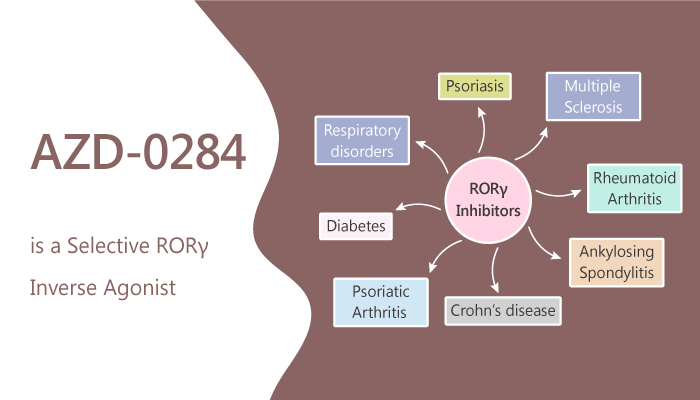RORγ (gene name RORC) is an orphan nuclear receptor (NR). Various metabolic processes regulate its expression and involvement. Meanwhile, RORγ is also a key player in the immune system. The lymphocyte-specific isoform RORγt is a so-called ‘master regulator’ of the IL-17 producing T helper (Th17) cell subset. Human patients with nonsense mutations are susceptible to candida infection of the lung. It suggests that the evolutionary pressure of RORγ weighs heavily on immune function. People extensively pursuing to develop the ligands that repress RORγt action to treat Th17-mediated autoimmune disorders such as multiple sclerosis and psoriasis. Targeting the RORγ has become the focus of many programs in both academia and industry. AZD-0284 is an inverse agonist of the nuclear receptor RORγ.

Psoriasis is a common chronic inflammatory skin disease with a spectrum of clinical phenotypes and results from the interplay of genetic, environmental, and immunological factors. Previous studies explicitly show that psoriasis is an autoimmune disease. That is predominantly mediated by T helper 17 (Th17) cells, which express high levels of interleukin-17 (IL-17) in response to interleukin-23 (IL-23). Th17 cells play an important role in the pathogenesis of psoriasis.
AZD-0284 binds inside the RORγ ligand-binding domain (LBD). In addition, AZD0284 inhibits IL-17A production in human TH17 cells. AZD0284 decreases the frequency of single IL-17+cell as well as double-positive TH17/1 cells.
All in all, AZD-0284 has good PK in preclinical species and inhibits IL-17 production in all CCR6+THsubsets; moreover, it reduces skin inflammation in vivo. AZD-0284 is a good candidate for treatment for psoriasis.
Reference:
Narjes, F, et al. American Chemical Society, 2017 Drug Design and Delivery Symposium 26 October 2017